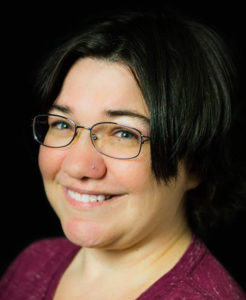Meet the New AHA Staff Member: Becca Ray

Learn more about the AHA’s new program assistant!
TheHumanist.com: What is your educational and work background?
I grew up in a very controlled environment with no room for secular education. I was often told that I didn’t need a secular education because the world would end before I ever finished college. In cases where this subtle discouragement was ignored, some of my peers were criticized and some even ostracized for choosing to pursue secular education. While I hold some regret about not having a degree to hang on the wall, I also realize that the path I was forced down has made me so much more passionate about what access to quality education can actually do for someone. So, instead of feeling regretful about it, I try to spin that energy into making positive waves when it comes to education.
For the last 6 years, I have been a stay-at-home mom after leaving my job at Disney to focus on family. I was sad to leave because the best place for a people person, like myself, is Disney World. My favorite thing about working for Disney was the expectation that we would go above and beyond to make people feel special. This is always something that has come naturally to me, so to have a job where that’s what I got to do all day, every day, was very special.
TheHumanist.com: How did you first learn about humanism?
I had heard the term humanism here and there, and just assumed it was a small religious sect. It wasn’t until my wife and I started forming a local atheist group that I realized that it was definitely not that. I just remember reading about humanism and thinking, “Yes! That label fits!”
TheHumanist.com: Did you grow up in a traditional religious faith? How did it impact you?
 I was born into a non-religious household. For the first several years of my life, there was no church, no mention of the bible or any gods. When I turned 8, all of that changed. My parents suddenly started studying the bible with Jehovah’s Witnesses. My entire world changed basically overnight. We immediately stopped celebrating all holidays, including birthdays, and we started going to the Kingdom Hall three nights a week for a total of five hours of indoctrination. This, of course, doesn’t count the endless hours of preparation for these meetings. We were very quickly consumed by this new “way of life.” This shift in our life impacted me in countless ways. It’s been more than fifteen years since I stopped practicing, but I am still discovering weird quirks I have that are a direct result of the things I was taught and the way they were taught. It was an interesting and difficult journey out of a high-control religion. But through my own difficulties, and speaking with others that had gone through similar experiences, I am encouraged by how resilient people can be.
I was born into a non-religious household. For the first several years of my life, there was no church, no mention of the bible or any gods. When I turned 8, all of that changed. My parents suddenly started studying the bible with Jehovah’s Witnesses. My entire world changed basically overnight. We immediately stopped celebrating all holidays, including birthdays, and we started going to the Kingdom Hall three nights a week for a total of five hours of indoctrination. This, of course, doesn’t count the endless hours of preparation for these meetings. We were very quickly consumed by this new “way of life.” This shift in our life impacted me in countless ways. It’s been more than fifteen years since I stopped practicing, but I am still discovering weird quirks I have that are a direct result of the things I was taught and the way they were taught. It was an interesting and difficult journey out of a high-control religion. But through my own difficulties, and speaking with others that had gone through similar experiences, I am encouraged by how resilient people can be.
TheHumanist.com: What interested you most about working for the American Humanist Association?
I have always had an inner voice pushing me to help people, take care of those in need, and speak up for those that can’t. I’m really excited to be part of an organization that champions so many things that have been my core values since before I even knew what humanism was. I’m happy to be joining a team of people who are passionate about social justice, climate action, and the true definition of religious freedom.
TheHumanist.com: What book has influenced you the most?
I’m not really much of a book reader. The physical act of picking up a book to read is actually quite triggering for me. I get severe anxiety if I have to read something thicker than a standard-size magazine. I blame the endless amounts of Jehovah’s Witness-published books that I was forced to read growing up. I will say that the book that probably shook me up and changed my life the most was Combatting Mind Control By Steven Hassan. I read it years after deciding to leave the Jehovah’s Witness religion. But it was unsettling to discover how much power the doctrine and control devices still held over my mind. Only after reading that book was I able to truly begin removing the guilt that had been buried so deep in my subconscious, and live authentically.
TheHumanist.com: If you could have dinner with any three people in the world (living or dead), who would they be and why?
I have seen how many people answer this question, and I always have a hard time narrowing it down to three. But OK, I’ll play.
#1 My paternal grandmother. We were always very close. She told me every chance she got that I was in a cult and that I should get out. Her house was a safe place for me to go when I was trying to figure out how to get out. She died and never got to see what my life became after I escaped the cult. She would be so proud, and I just really miss her.
#2 Robin Williams. There is just something about him that has always fascinated me. He always seemed like he was just genuinely hilarious without a lot of effort. I’m a comedy junkie, and he is my favorite of all time.
#3 This might be a little bit of a cheat because it’s not one specific person, but it’s one I’ve actually thought about a lot. I have a soft spot for kids and teens in the LGBT community. I will go out of my way to make sure they are happy and safe. Unfortunately, many of them don’t have supportive parents. So, something as mundane as a Tuesday night family dinner can be an awful experience. I want to have dinner with any and all of those kids, any time they need a safe place to just be. Everyone deserves to have a safe place to eat.
